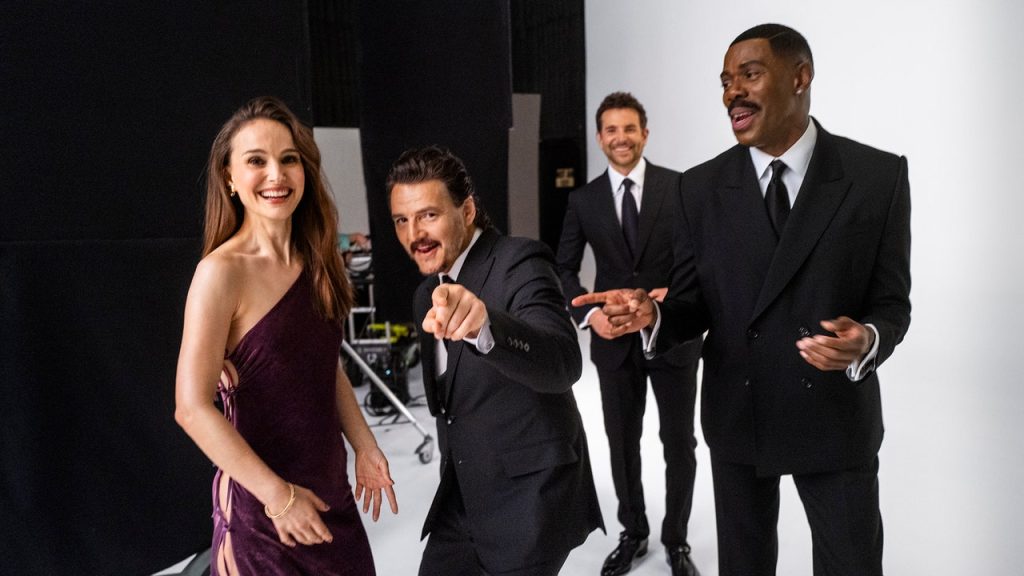Natalie Portman, who appears on our Hollywood 2024 cover, walked her first red carpet at 13. She received her first Academy Award nomination at 23, and a win six years later. Her notable roles have included a hit man’s mentee, an unraveling ballerina, a faux medium, a pop star, and Jacqueline Kennedy. Now, as Elizabeth Berry in May December, Portman joins a storied collection of actors playing actors—from Gena Rowlands in Opening Night to Bette Davis in All About Eve—in a role she’s been preparing for, in many ways, since she debuted in Léon: The Professional three decades ago. Here, on a Zoom with Vanity Fair from her home in Paris, she discusses the changing world of Hollywood, and coming to terms with her kaleidoscope of public and private selves.
Vanity Fair: You seem drawn to roles that play with the line between public performance and private life. I’m thinking of Jackie, Planetarium, Vox Lux, and Black Swan. What draws you to those roles?
Natalie Portman: It’s definitely the topic that I return to. Or several of the topics. One is these different kinds of performances—private, public, the different performances for different people in your life; the performances that make identity; the relationship between performance and identity. I think that it’s one of the subjects for every human, but particularly an actress; you become hyperaware of that. And having a public and private life from a very young age, I’m sure has made me more attuned to that and more curious about it.
Your role as Elizabeth in May December both celebrates and skewers the act of creating a character, and a movie. What was that like to play?
It was really fun and interesting to get to explore the behavior and ethics around using someone’s life as your source material. I think journalists have an adjacent kind of quandary. Documentarians also. When you’re using real stories, there is a vampiric quality that you have to beware of, and there is a question of whether it’s really possible to be non-interfering in your subject’s life. Like, does the depiction alone interfere in someone’s life? Does your depiction in itself affect the course of the story? Of course, Elizabeth takes it many steps further, but they’re really interesting and wonderful questions to explore, even if there are no answers.
Was there anything that felt particularly new or challenging in this role?
One of the things that was challenging was to master the tone. Because there were aspects that, like you were saying, kind of skewer “the actress” and the pursuit of truth. There are aspects that, reading it, felt like satire—like when she’s watching the videotapes of the boys and she says that awful line, which I won’t spoil or repeat. But there are so many aspects that do feel like we can laugh at her, and I really was tempted to. [Director] Todd [Haynes] really pushed me to make her very true and human and trustable when we meet her, so that it is more surprising later on. And that was an incredible direction to be given, but definitely went against a lot of my instincts.
Something that scared me in Jackie was doing an impression of a real person; in May December, I was doing an impression of someone who was acting right next to me. That was quite terrifying and had to be learned on the fly. Julianne [Moore] and I were really playing off of each other. It feels weird to be considered separately from her in any way because it feels like such a conjoined performance.
There’s this constant push-pull of power dynamics, and so much bubbling right under the surface. How did you come up with that?
A lot is thanks to Samy [Burch’s] writing, which had all these incredible barbs. It was so deceptively spare and simple on the page, and then everything was just so loaded. There was so much meaning in the silences. Todd added to it with his choice of doing all of this reflection work, using the camera as a mirror and having us reflect each other, I think really created this sense of these women reflecting one another in such a way that they repel each other as much as they are drawn to each other. The extent to which they recognize themselves in the other makes each other the clear enemy as well as the one they’re in love with and drawn to and seduced by. It has this incredible tension the whole time because of that really incredible choice he made with all the mirrors.
There’s this ongoing, voracious interest in the idea of Method acting—maybe because everybody’s interested in those blurred lines between public and private—and you recently said something so interesting about the idea of Method acting maybe being a cost that women can’t afford. Is that something that you wish you could do?
